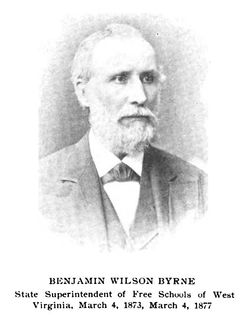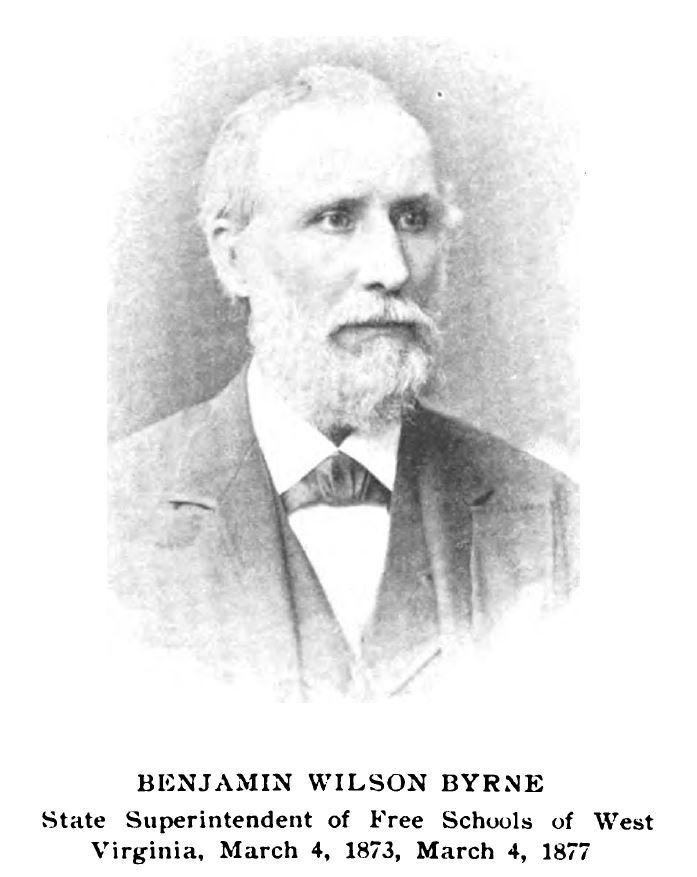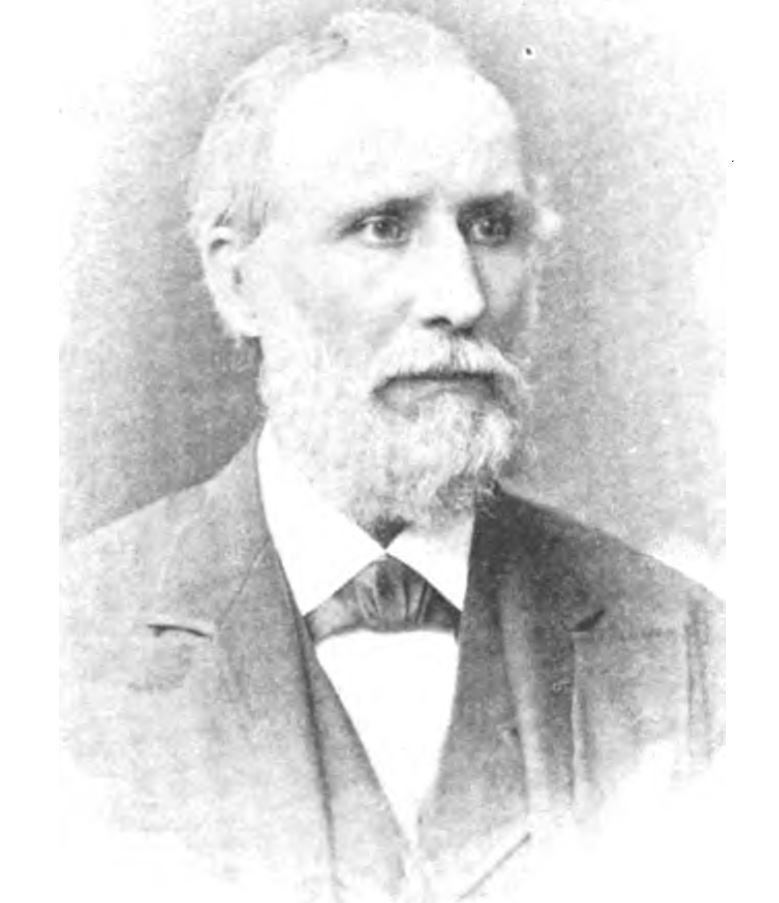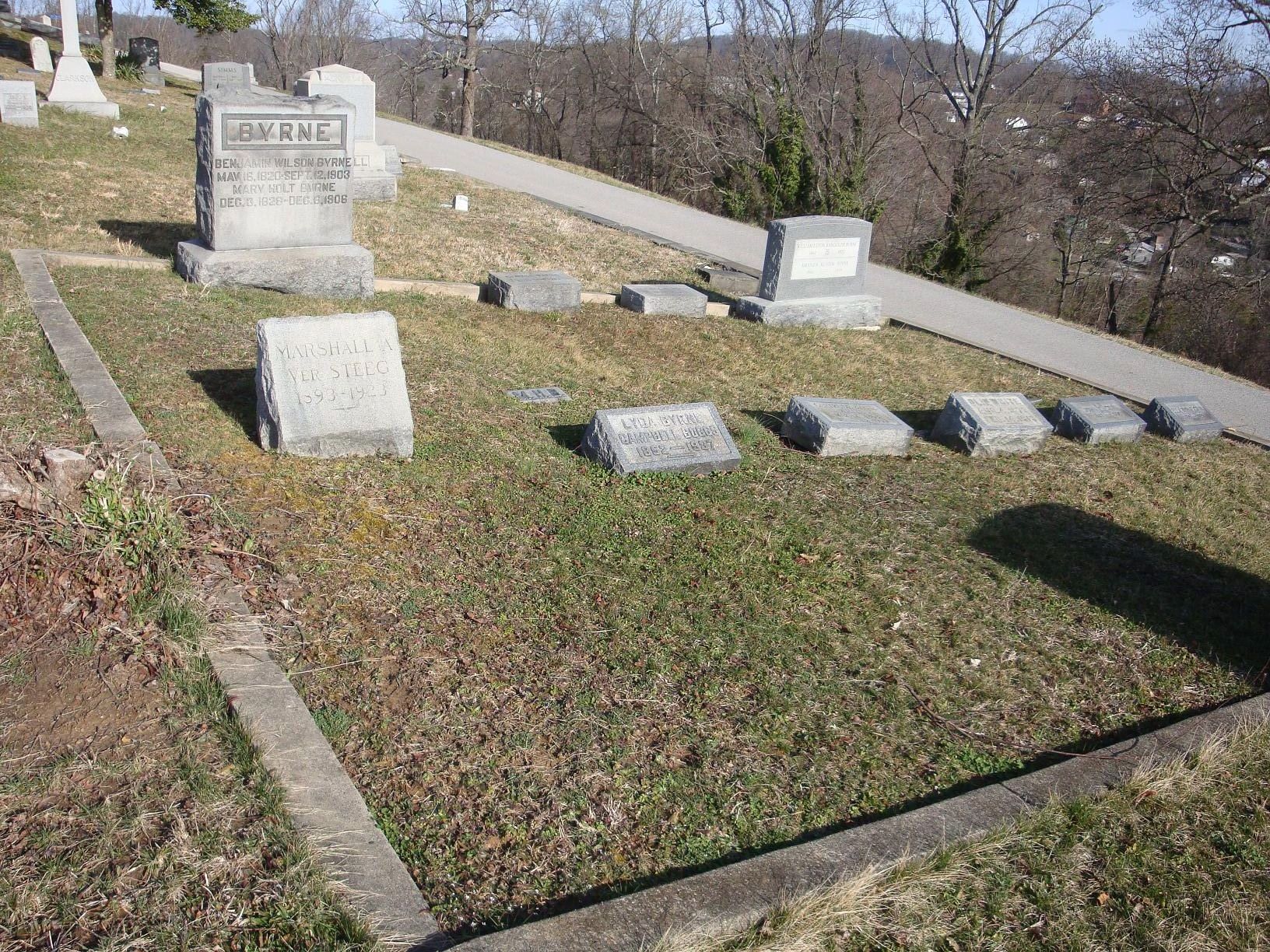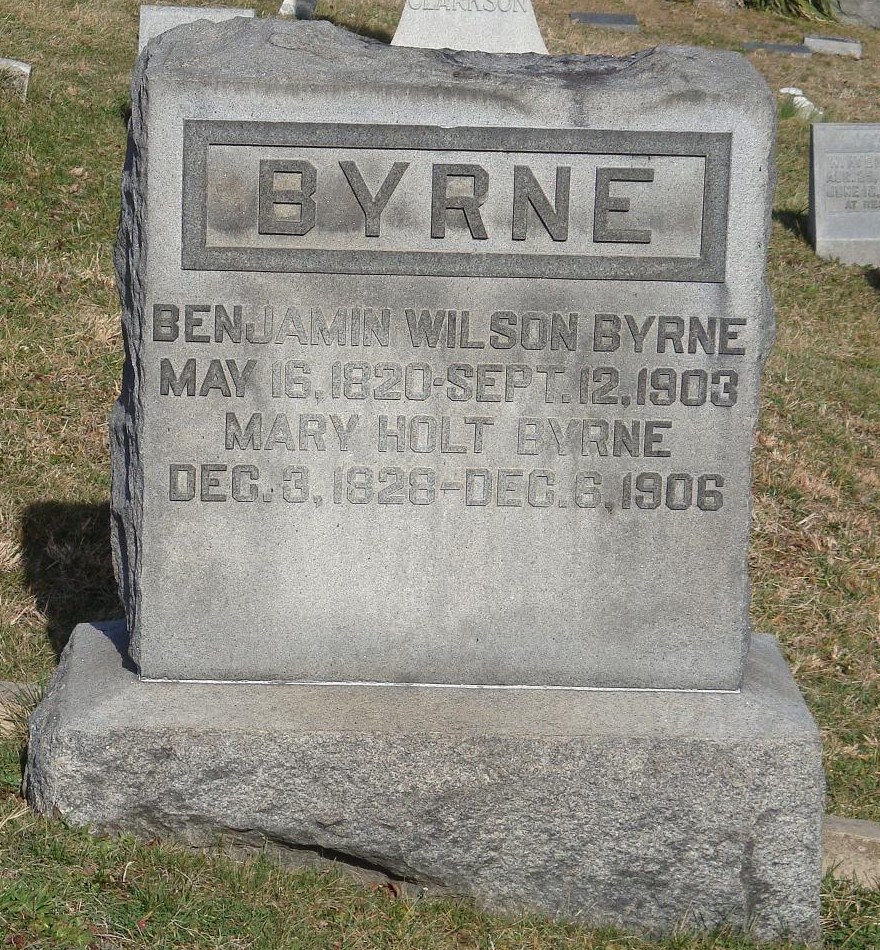History of Braxton County and Central West Virginia (1919), pp. 354 and 355:
[Benjamin Wilson Byrne.
Benjamin Wilson Byrne was born May 16, 1820, near Burnsville, in Lewis (now Braxton county) Virginia. He was the son of John B. Byrne and Ann Haymond Byrne. His ancestors settled in Prince William county. Virginia, in 1720. Early in the last century his father moved to and settled in what was then Harrison (now Braxton county). His family connections were numerous, and among them were the Raymonds, Wilsons, Camdens, Holts and other distinguished families who adorned the history of Virginia and later West Virginia. He was well educated and studied law at the famous law school of Judge Lucas P. Thompson in Staunton, Va. In 1848, almost as soon as he was licensed to practice law, he was elected to the legislature from the district composed of Braxton, Lewis and Gilmer, the same territory now covering Calhoun, Upshur, half of Clay and half of Webster, and portions of Barbour and Ritchie, a grand constituency. He served in the session of 1848-49, and in the extra session of 1849, called to revise the code.
In 1849, he married Mary Louisa Holt, daughter of Jonathan Holt, and sister of the late Hon. Homer A. Holt, of the Supreme bench, and also of Mrs. T. B. Camden of Parkersburg. He was again elected to the legislature in 1857 from the counties of Braxton and Nicholas, and in that year he had the new county of Clay carved out of Kanawha, Braxton and Nicholas. He served in another session in 1858.
Colonel Byrne's children surviving him are Mrs. J. C. Given of Canton, Ohio ; Mrs. J. M. Boggs of Big Otter, this state ; Mrs. M. W. Venable, Mrs. Olin White, George Byrne and W. E. It. Byrne of Charleston. These and their children and his devoted widow will mourn him and revere his memory as a beloved husband and an unselfish and ever land father, while this city and state will always honor the memory of his useful and honorable life. His death occurred at Charleston in September, 1903.]
Encyclopaepdia of Contemporary Biography of WV (1894), pp. 116-118:
[BENJAMIN W. BYRNE.
HON. BENJAMIN WILSON BYRNE, member of the Legislature in both Virginias and State Superintendent of Free Schools in West Virginia, was born on May 16, 1820, on the Little Kanawha River, at the mouth of Salt Lick Creek, near Burnsville, in Lewis, now Braxton, County. He had six brothers and four sisters. When he was one year old his parents moved to the Bulltown Salt Works, where he was brought up. He was the son of John B. Byrne and Ann Haymond Byrne. His paternal ancestor came to Virginia and settled in Prince William County about the year 1720, and his great-grandfather was descended from this ancestor. Colonel Byrne's father was the son of Peyton Byrne, who moved from Prince William County, Va., early in the present century, to the Little Kanawha River, in Harrison County—now Braxton—and settled at the mouth of Salt Lick Creek. His mother was the daughter of Col. John Haymond, who lived in the Monongahela Valley from boyhood and who took part in the struggle with the Indians when making incursions into the white settlements of the Monongahela Valley. Colonel Haymond married Mary Wilson, daughter of Col. Ben Wilson, of Harrison County, who was a colonel under Governor Dunmore in the war between the English and the French and Indians on the western frontier, and one of the early settlers of the Monongahela Valley, and was the progenitor of thirty children, most of whom lived to rear families. The Haymond family were about half as numerous, being about fifteen or sixteen children of William Haymond, the father of Col. John Haymond. These two families of Haymond and Wilson, together with a contemporary family, the Jacksons, are probably the most numerous families now in the State. B. W. Byrne was raised on his father's farm, attended the winter schools, and when he was twenty years old attended Rector College two years and a half under the tuition of Prof. Charles Wheeler, an eminent educator from Massachusetts. Later on he read law with the Hon. William G. Brown, of Kingwood, Mathew Edmiston, of Weston, and attended Judge Lucas P. Thompson's law school at Staunton. He obtained his license to practise law in the spring of 1848, being signed by Judges Baldwin, of Virginia Supreme Court, Smith, of the Rockingham County Circuit, and Thompson, of the Augusta Circuit Court. On returning home from the law school he was elected to the Legislature of Virginia from the district composed of the counties of Braxton, Lewis, and Gilmer, the same territory which now covers the counties Calhoun, Upshur, half of Clay, and half of Webster Counties; also that part of Barbour County that was taken from Lewis and that part of Ritchie County that was taken from Lewis. He served in the winter session of 1848-49 and in the extra summer session of 1849 which was called for the purpose of revising the code of the State laws. On the 1 8th of September, 1849, he married Mary Louisa Holt, daughter of Jonathan Holt. His wife was born in Beaver, Pa., but moved with the family to Virginia in infancy. She had one brother, the Hon. Homer A. Holt, of the State Supreme bench, and one sister, Susan E., the wife of Dr. Thomas B. Camden, of Parkersburg. She had also two half-brothers by a subsequent marriage of her father. Mr. Byrne then continued the practice of his profession till the fall of i860. In 1857, however, he was again elected from Braxton and Nicholas Counties to the House of Delegates of Virginia; and during the winter session he procured the passage of the law creating the county of Clay out of the counties of Nicholas, Braxton, and Kanawha. He also served another short extra session in the spring of 1858, which was called by Governor Wise immediately after the adjournment of the regular session to finish up business of importance. In 1859 Mr. Byrne and Johnson N. Camden concluded to try to have a county formed on the upper Elk River. They accordingly prepared, published, and posted notices, as the law required, that an application would be made to the Legislature, and placed the matter in the hands of Joseph A. Alderson, who then represented that district in the Senate, and who engaged earnestly in the object of the petition and succeeded in forming the new county, which, much to the gratification of its friends, he named Webster, after the great statesman Daniel Webster. In December, i860, the oil excitement was running high at Burning Springs, in Wirt County, and at the suggestion of Johnson N. Camden, Colonel Byrne went to Burning Springs and selected a lease and went on to Parkersburg, where he was joined by Hon. J. N. Camden, the Hon. Gideon D. Camden, and the Hon. John J. Jackson, Jr. They all journeyed to the oil field and purchased the lease of J. C. Rathbone as equal partners. The others returned home, leaving Colonel Byrne in charge to sink a well on the lease, which he did; and late in January, 1861, at the depth of one hundred and fifty feet, he struck a very valuable well which promised large remuneration, but not being equipped with engine, tubing, and tanks to pump and store the oil, it being a flowing well, only as much of the oil was saved as could be gathered in excavations in the ground, and by storing in what few small boats could be brought near the well on the edge of the river, amounting to about one hundred barrels per day. This was the well which became noted by being named the "Eternal Centre." About this time and before he had the well equipped for successful work. Colonel Byrne was notified by special messenger from home that he had been elected by his constituents to the Virginia convention which played such an important part in the drama of the next four years—the secession convention of Virginia. He was notified by his constituents that they had elected him without his knowledge or consent because they had more confidence in his conservatism than they had in the other candidates, and that they thought he would be less likely to be carried away by excitement. This was an appeal and a compliment which he could not resist. He therefore very reluctantly accepted the position, went to Richmond, and entered upon the discharge of his duties, and except for a very short interval he saw nothing more of the oil field for four long and eventful years. His course in the convention was conservative from first to last, voting against every proposition looking to secession, and when the final vote came he was one of the fifty-five who voted against the ordinance of secession in opposition to the eighty-three who voted for it; and, unlike most of those who voted against it, he refused to change his vote and record it with the majority. The issue of war having been made up, the most important problem was then presented, what course to take in the great struggle that was pending? He was bitterly opposed to secession and strongly attached to the Union as the palladium of our liberties ; but believing, as he did, that the issue presented was that of independence or subjugation, after mature thought he could not persuade himself that it was right for him to aid in the subjugation of his own people. He therefore determined to follow the fortunes of his fellow-citizens among whom he was born and raised, and although he had little hope of independence, it was his duty to share the fate of his State and section. He, as Colonel of the militia of his county, organized and commanded them for a few weeks, disbanding them when Governor Wise retreated from Kanawha Valley; he was engaged during most of the war in the Nitre Bureau and as enrolling officer at Staunton when the war ended. At the end of the war he returned with his family, who went south with him to Parkersburg, and again went into the oil business, was unsuccessful, and moved from there to Clay County, where he spent several years in the settlement of land titles to large bodies of lands, in which he was very successful. He probably settled the title to more lands with more adverse claimants, mostly by compromise, than any man in the State, amounting to nearly 200,000 acres, nearly all of which he made sale of for the owners. In 1871 he was elected in Clay and Nicholas Counties to the Convention to amend the State Constitution which met in Charleston in January, 1872. In that convention he was made Chairman of the Committee on County Organization. He took an active part in the discussion and organization of the school system provided for in the constitution, also in forming the chapter on land titles. At the August election in 1872 he was elected State Superintendent of Schools, in which office he served acceptably for four years. The school system of West Virginia was then in its infancy, and he devoted his time more especially to organizing the financial part of the system and procuring proper returns from the school officers, who had not yet acquired such experiences as to make them efficient in their duties. In 1882 he was elected to the State Senate for the term of four years. In the session of 1883 he was made Chairman of the Committee on Free Schools, and also of a special committee to investigate the general subject of the school funds, which had gotten a little out of joint. In the session of 1885 he was appointed Chairman of the Senate Finance Committee, which was charged with the duty of preparing a bill to revise the laws of the State for the proper assessment of property and collection of the State taxes. Most of the session was spent in the preparation and discussion of a bill covering the whole subject of the tax laws, but which he and other Senators who were equally earnest with him failed to have enacted into a law. In January, 1892, Colonel Byrne was appointed by Governor Fleming to procure from the Legislature of Virginia the passage of an act to transfer from Virginia to West Virginia such of the title papers as still remained in Virginia relating exclusively to land titles in West Virginia, and to copy such others as could not be so transferred. He visited Richmond on this mission and was entirely successful. In the same year he was also appointed by the Governor President of the Board of Regents in charge of the West Virginia Colored Institute, a school organized under the provisions of a law passed by Congress for the instruction of the colored race in the English branches of education as well as in agricultural and mechanical pursuits. For this position his large experience in educational administration qualifies him admirably. Colonel Byrne is one of the best of authorities on the geographical formations and political history of the two Virginias, and takes a zealous interest in promoting the West Virginia Historical and Antiquarian Society, of which he is a director.]
History of Braxton County and Central West Virginia (1919), pp. 354 and 355:
[Benjamin Wilson Byrne.
Benjamin Wilson Byrne was born May 16, 1820, near Burnsville, in Lewis (now Braxton county) Virginia. He was the son of John B. Byrne and Ann Haymond Byrne. His ancestors settled in Prince William county. Virginia, in 1720. Early in the last century his father moved to and settled in what was then Harrison (now Braxton county). His family connections were numerous, and among them were the Raymonds, Wilsons, Camdens, Holts and other distinguished families who adorned the history of Virginia and later West Virginia. He was well educated and studied law at the famous law school of Judge Lucas P. Thompson in Staunton, Va. In 1848, almost as soon as he was licensed to practice law, he was elected to the legislature from the district composed of Braxton, Lewis and Gilmer, the same territory now covering Calhoun, Upshur, half of Clay and half of Webster, and portions of Barbour and Ritchie, a grand constituency. He served in the session of 1848-49, and in the extra session of 1849, called to revise the code.
In 1849, he married Mary Louisa Holt, daughter of Jonathan Holt, and sister of the late Hon. Homer A. Holt, of the Supreme bench, and also of Mrs. T. B. Camden of Parkersburg. He was again elected to the legislature in 1857 from the counties of Braxton and Nicholas, and in that year he had the new county of Clay carved out of Kanawha, Braxton and Nicholas. He served in another session in 1858.
Colonel Byrne's children surviving him are Mrs. J. C. Given of Canton, Ohio ; Mrs. J. M. Boggs of Big Otter, this state ; Mrs. M. W. Venable, Mrs. Olin White, George Byrne and W. E. It. Byrne of Charleston. These and their children and his devoted widow will mourn him and revere his memory as a beloved husband and an unselfish and ever land father, while this city and state will always honor the memory of his useful and honorable life. His death occurred at Charleston in September, 1903.]
Encyclopaepdia of Contemporary Biography of WV (1894), pp. 116-118:
[BENJAMIN W. BYRNE.
HON. BENJAMIN WILSON BYRNE, member of the Legislature in both Virginias and State Superintendent of Free Schools in West Virginia, was born on May 16, 1820, on the Little Kanawha River, at the mouth of Salt Lick Creek, near Burnsville, in Lewis, now Braxton, County. He had six brothers and four sisters. When he was one year old his parents moved to the Bulltown Salt Works, where he was brought up. He was the son of John B. Byrne and Ann Haymond Byrne. His paternal ancestor came to Virginia and settled in Prince William County about the year 1720, and his great-grandfather was descended from this ancestor. Colonel Byrne's father was the son of Peyton Byrne, who moved from Prince William County, Va., early in the present century, to the Little Kanawha River, in Harrison County—now Braxton—and settled at the mouth of Salt Lick Creek. His mother was the daughter of Col. John Haymond, who lived in the Monongahela Valley from boyhood and who took part in the struggle with the Indians when making incursions into the white settlements of the Monongahela Valley. Colonel Haymond married Mary Wilson, daughter of Col. Ben Wilson, of Harrison County, who was a colonel under Governor Dunmore in the war between the English and the French and Indians on the western frontier, and one of the early settlers of the Monongahela Valley, and was the progenitor of thirty children, most of whom lived to rear families. The Haymond family were about half as numerous, being about fifteen or sixteen children of William Haymond, the father of Col. John Haymond. These two families of Haymond and Wilson, together with a contemporary family, the Jacksons, are probably the most numerous families now in the State. B. W. Byrne was raised on his father's farm, attended the winter schools, and when he was twenty years old attended Rector College two years and a half under the tuition of Prof. Charles Wheeler, an eminent educator from Massachusetts. Later on he read law with the Hon. William G. Brown, of Kingwood, Mathew Edmiston, of Weston, and attended Judge Lucas P. Thompson's law school at Staunton. He obtained his license to practise law in the spring of 1848, being signed by Judges Baldwin, of Virginia Supreme Court, Smith, of the Rockingham County Circuit, and Thompson, of the Augusta Circuit Court. On returning home from the law school he was elected to the Legislature of Virginia from the district composed of the counties of Braxton, Lewis, and Gilmer, the same territory which now covers the counties Calhoun, Upshur, half of Clay, and half of Webster Counties; also that part of Barbour County that was taken from Lewis and that part of Ritchie County that was taken from Lewis. He served in the winter session of 1848-49 and in the extra summer session of 1849 which was called for the purpose of revising the code of the State laws. On the 1 8th of September, 1849, he married Mary Louisa Holt, daughter of Jonathan Holt. His wife was born in Beaver, Pa., but moved with the family to Virginia in infancy. She had one brother, the Hon. Homer A. Holt, of the State Supreme bench, and one sister, Susan E., the wife of Dr. Thomas B. Camden, of Parkersburg. She had also two half-brothers by a subsequent marriage of her father. Mr. Byrne then continued the practice of his profession till the fall of i860. In 1857, however, he was again elected from Braxton and Nicholas Counties to the House of Delegates of Virginia; and during the winter session he procured the passage of the law creating the county of Clay out of the counties of Nicholas, Braxton, and Kanawha. He also served another short extra session in the spring of 1858, which was called by Governor Wise immediately after the adjournment of the regular session to finish up business of importance. In 1859 Mr. Byrne and Johnson N. Camden concluded to try to have a county formed on the upper Elk River. They accordingly prepared, published, and posted notices, as the law required, that an application would be made to the Legislature, and placed the matter in the hands of Joseph A. Alderson, who then represented that district in the Senate, and who engaged earnestly in the object of the petition and succeeded in forming the new county, which, much to the gratification of its friends, he named Webster, after the great statesman Daniel Webster. In December, i860, the oil excitement was running high at Burning Springs, in Wirt County, and at the suggestion of Johnson N. Camden, Colonel Byrne went to Burning Springs and selected a lease and went on to Parkersburg, where he was joined by Hon. J. N. Camden, the Hon. Gideon D. Camden, and the Hon. John J. Jackson, Jr. They all journeyed to the oil field and purchased the lease of J. C. Rathbone as equal partners. The others returned home, leaving Colonel Byrne in charge to sink a well on the lease, which he did; and late in January, 1861, at the depth of one hundred and fifty feet, he struck a very valuable well which promised large remuneration, but not being equipped with engine, tubing, and tanks to pump and store the oil, it being a flowing well, only as much of the oil was saved as could be gathered in excavations in the ground, and by storing in what few small boats could be brought near the well on the edge of the river, amounting to about one hundred barrels per day. This was the well which became noted by being named the "Eternal Centre." About this time and before he had the well equipped for successful work. Colonel Byrne was notified by special messenger from home that he had been elected by his constituents to the Virginia convention which played such an important part in the drama of the next four years—the secession convention of Virginia. He was notified by his constituents that they had elected him without his knowledge or consent because they had more confidence in his conservatism than they had in the other candidates, and that they thought he would be less likely to be carried away by excitement. This was an appeal and a compliment which he could not resist. He therefore very reluctantly accepted the position, went to Richmond, and entered upon the discharge of his duties, and except for a very short interval he saw nothing more of the oil field for four long and eventful years. His course in the convention was conservative from first to last, voting against every proposition looking to secession, and when the final vote came he was one of the fifty-five who voted against the ordinance of secession in opposition to the eighty-three who voted for it; and, unlike most of those who voted against it, he refused to change his vote and record it with the majority. The issue of war having been made up, the most important problem was then presented, what course to take in the great struggle that was pending? He was bitterly opposed to secession and strongly attached to the Union as the palladium of our liberties ; but believing, as he did, that the issue presented was that of independence or subjugation, after mature thought he could not persuade himself that it was right for him to aid in the subjugation of his own people. He therefore determined to follow the fortunes of his fellow-citizens among whom he was born and raised, and although he had little hope of independence, it was his duty to share the fate of his State and section. He, as Colonel of the militia of his county, organized and commanded them for a few weeks, disbanding them when Governor Wise retreated from Kanawha Valley; he was engaged during most of the war in the Nitre Bureau and as enrolling officer at Staunton when the war ended. At the end of the war he returned with his family, who went south with him to Parkersburg, and again went into the oil business, was unsuccessful, and moved from there to Clay County, where he spent several years in the settlement of land titles to large bodies of lands, in which he was very successful. He probably settled the title to more lands with more adverse claimants, mostly by compromise, than any man in the State, amounting to nearly 200,000 acres, nearly all of which he made sale of for the owners. In 1871 he was elected in Clay and Nicholas Counties to the Convention to amend the State Constitution which met in Charleston in January, 1872. In that convention he was made Chairman of the Committee on County Organization. He took an active part in the discussion and organization of the school system provided for in the constitution, also in forming the chapter on land titles. At the August election in 1872 he was elected State Superintendent of Schools, in which office he served acceptably for four years. The school system of West Virginia was then in its infancy, and he devoted his time more especially to organizing the financial part of the system and procuring proper returns from the school officers, who had not yet acquired such experiences as to make them efficient in their duties. In 1882 he was elected to the State Senate for the term of four years. In the session of 1883 he was made Chairman of the Committee on Free Schools, and also of a special committee to investigate the general subject of the school funds, which had gotten a little out of joint. In the session of 1885 he was appointed Chairman of the Senate Finance Committee, which was charged with the duty of preparing a bill to revise the laws of the State for the proper assessment of property and collection of the State taxes. Most of the session was spent in the preparation and discussion of a bill covering the whole subject of the tax laws, but which he and other Senators who were equally earnest with him failed to have enacted into a law. In January, 1892, Colonel Byrne was appointed by Governor Fleming to procure from the Legislature of Virginia the passage of an act to transfer from Virginia to West Virginia such of the title papers as still remained in Virginia relating exclusively to land titles in West Virginia, and to copy such others as could not be so transferred. He visited Richmond on this mission and was entirely successful. In the same year he was also appointed by the Governor President of the Board of Regents in charge of the West Virginia Colored Institute, a school organized under the provisions of a law passed by Congress for the instruction of the colored race in the English branches of education as well as in agricultural and mechanical pursuits. For this position his large experience in educational administration qualifies him admirably. Colonel Byrne is one of the best of authorities on the geographical formations and political history of the two Virginias, and takes a zealous interest in promoting the West Virginia Historical and Antiquarian Society, of which he is a director.]
Family Members
Sponsored by Ancestry
Advertisement
Explore more
Sponsored by Ancestry
Advertisement
